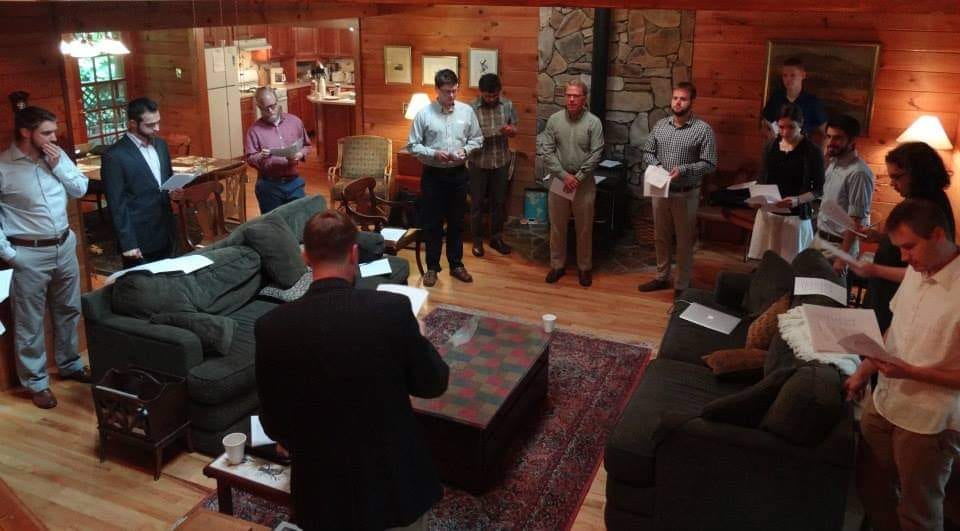Federal Vision, NA
The FV that I am familiar with is not merely a theology of a decade or so ago, but a cultural and ecclesiastical spirit that is alive and well, and very appealing to some in my generation.
I never thought I was “Federal Vision.”
(What’s the correct grammar? A “Federal Visionary”?)
Then, some things happened, and I found that I was attending a church whose pastor was influential within the movement and who had faced a presbytery trial on exactly these theological charges.
I’m not the only one who has arrived at our church and been surprised to discover that that made us FV. Earlier this week, a friend from our church was looking for an explanation of “Federal Vision” theology. In this essay, I intend to give such an explanation.
Now, this has been done before, and by more capable and knowledgeable individuals: Steven Wedgeworth has given a great history and theological explanation in a series of six blog posts, in which he argues that FV is a spent force. Earlier in the controversy, Joe Minich wrote a lengthy argument that FV was in the bounds of Reformed orthodoxy (no longer publicly available, though he has sent me a copy if anyone is interested). And of course, the proponents of FV have written much, including the helpful book, The Auburn Avenue Theology, Pros and Cons: Debating the Federal Vision.
However, the FV that I am familiar with is not merely a theology of a decade or so ago, but a cultural and ecclesiastical spirit that is alive and well, and very appealing to some in my generation. Let’s be honest: The “Federal Vision” that I and my acquaintances discuss is almost exclusively the fruit of the online writing of Doug Wilson. It is primarily associated with the practice of paedocommunion, a refusal to try to determine the condition of the heart, sympathy for Christendom, and a sort of joyful confidence in its Christian approach to culture, exemplified by a man and his family happily singing psalms together.
In Wedgeworth’s explanation, there are all sorts of theological differences among FV proponents. Some, called FV light, or by Wilson, FV “Amber Ale” claim to be fully in line with the Reformed tradition. Others, the chief intellectuals of the movement, James Jordan and Peter Leithart, claim to be going beyond or undoing the Reformation. They make up FV Dark, or what Wilson calls, FV “Oatmeal Stout.” Each of these FV’s was strongly Van Tillian and relatively theonomic.
But the FV that I know counts itself fully Reformed, claiming to be most in line with the Reformation tradition. Likewise, it has nothing to do with philosophical idiosyncrasies, including the postmodern anti-realism Jordan espouses and with which Leithart flirts. Van Tillianism is in fact optional, as another generation influenced by FV has proposed a Reformed Thomistic foundation for it. (This is exemplified in both the Davenant Institute and Stephen Wolfe’s The Case for Christian Nationalism, in different ways.)
What is this distilled, palatable concentrate of the Federal Vision? Let me call it “Federal Vision, NA.” A non-alcoholic Federal Vision is the result, a generation on, of the public ministries of both Oatmeal Stout and Amber Ale versions of FV.
FVNA is not the FV movement, which mostly occurred before my time. FVNA is what remains of the theological influence of the Federal Vision that I and others I know feel and embrace. Let me list thirteen tenets of Federal Vision, NA theology and church practice. Then, I’ll explain each in turn.
Tenets of Federal Vision, NA:
Paedocommunion
Refraining from Judging Regeneration
Favorable view of Christendom and cultural Christianity
The Necessity of Obedience for Salvation
Treating Apostasy as a Real Possibility
An “As If” Approach to Sacramental Efficacy
A Reformed Catholic approach
Not Combative about who’s “Reformed”
A Joyful, Confident Christian Attitude
Liturgical Reformation
Appreciation of Masculinity in Christianity
Political Conservatism
Culture-Building
1. Paedocommunion
Simply, paedocommunion is the most obvious marker in church practice of Federal Vision theology and the theological proposal that has had the widest appeal. This is partly because accepting paedocommunion does not require adopting all of the other details of FV.
2. Refraining from Judging Regeneration
However, paedocommunion is closely related to another doctrine of the Federal Vision: The practice of paedocommunion indicates that the sacraments should be administered to the visible church, without any sort of boundary between its members and those who we treat as “real Christians.” Children are taken to be Christians because they are members of the visible church. They must be taught to be Christians not in name only but also in inner, spiritual reality (a reality James Jordan unwisely denies).
3. A Favorable View of Christendom and Cultural Christianity
This approach to Christian identity also involves a favorable view of Christendom and cultural Christianity. In fact, debate over infant baptism has always had this political-theological implication. The Anabaptists opposed cultural Christianity and Christendom and, for that reason, required rebaptism based on profession of faith, taken to be reflective of conversion and regeneration. FV critiques many presbyterians, who baptize infants, for treating it as if it is meaningless; these presbyterians join the rest of American evangelicalism in being political and philosophical Anabaptists in practice.
4. The Necessity of Obedience and Good Works for Final Salvation
Given that our Christian profession is no guarantee of inner regeneration, Federal Vision refocuses Christians on the Christian life and the necessity of good works for final salvation. Here is where FV really encounters the accusation of legalism or neonomianism and “denying the gospel.” A large swath of Reformed folk seem to think that the relationship between justification, sanctification, assurance, and final salvation, is something like this: All professing Christians, vetted by a session and allowed into church membership (by profession of faith), have reason to believe that they are justified and so should have assurance of final salvation right now. If you argue that that assurance should be at all attenuated or indexed to our good works, you are denying the doctrine of justification by faith and of the possibility of assurance of salvation.
The correct response to this would be 1) that is not justification by faith but justification by profession of faith, and 2) assurance of salvation is impossible on the basis of a profession of faith alone, because of the possibility of apostasy.
In fact, the Bible teaches justification by faith and the necessity of a Christian life of obedience and good works to final justification, the declaration we hope one day to hear: “Well done, thou good and faithful servant.”
5. Treating Apostasy as a Real Possibility
By the same token, the Bible teaches that apostasy is a real possibility. The warnings of the book of Hebrews especially are not merely a scare tactic, nor are they directed only to hypocrites. (After all, who thinks he’s a hypocrite?) Of course, Calvinism never denied the possibility of apostasy. It merely argued that those who apostatize were never really regenerate. “They went out from us because they were not of us.” FV affirms exactly this, except it insists that we cannot know that we are not the hypocrites. We have no way to know, so it actually depends on our continuing to live in Christian obedience and continuing to exercise Christian faith.
6. An “As If” Approach to Sacramental Efficacy
Because FV denies a view into people’s hearts, it says that we must and can only view the world through the lens of the visible church, which Federal Vision identifies as the realm of the covenant, hence, “Federal Vision.” This means that, while Calvinism is true in theory, Christian practice can and should look pretty Catholic. Yes, people are saved directly by the Spirit of God. There is a categorical distinction between the elect and the reprobate, and between the regenerate and the unregenerate.
But none of this is open to our view. Instead, we can see who is professing faith, who is a member of the visible church, who participates in the sacraments, and who is obeying God and doing good works. This means that, for practical purposes, we have no use for the distinction between the regenerate and the unregenerate.
As a result, we can and should act as if the sacraments were efficacious, good works contribute to salvation, and apostasy is a real possibility.
This opens up a distinction between two uses of each soteriological term. In addressing the visible church, we address God’s elect, but of course, some may not be elect, in the ultimate, salvific sense. So, we distinguish the covenantally elect from the decretally elect. Of course, these are not two kinds of the elect, but two stages in the historical process of the covenant coming to include all those in God’s decree and to exclude those not in God’s decree.
7. A Reformed Catholic approach
Federal Vision opens up a friendlier view of most Christians pre-Reformation and outside of Protestantism today. Across most of church history and most of the church today, justification by faith is not what is taught. In Roman Catholicism and Eastern Orthodoxy, sacerdotalism is taught, that is, the view that grace comes directly through the sacraments, ex opere operato. But in fact, undoubtedly many of the elect will be brought in through these sacerdotalist traditions. Federal Vision allows for a helpful explanation of why. Justification by works and sacerdotalism is, in practice, not far from what Christian practice should be. It is just the wrong theological explanation of salvation.
For instance, when a Catholic commits a mortal sin and needs to confess that and do penance, that is probably a good ritual whereby to effect genuine repentance which is what is theologically necessary. The Catholic explanation is wrong, and even legalist, but what is actually occurring soteriologically is what Reformed Protestants say, even among those who don’t say what we say.
8. Not Combative about Who Is “Reformed”
Just as Federal Vision takes a friendly attitude to those outside the Reformed tradition, they take a friendlier approach within the Reformed tradition. Apart from the polemics of the debate itself, the attitude that one has in embracing aspects of Federal Vision is that the debate over who is truly Reformed is moot. If you appreciate the Reformed tradition but pick and choose theologically, no one can judge you definitely in or out, and it wouldn’t matter if they could.
Having been criticized for not being truly Reformed, Federal Vision advocates rightly point out that we should be seeking truth not being as truly Reformed as possible. The intellectually curious, for that reason, gravitate to Federal Vision, simply because it is so often cast as heretical, in spite of being well within whatever bounds of Reformed orthodoxy there are. In this intellectual curiosity, the Davenant Institute has been my guide, along with the once-existent Reformed Irenics email list.
9. A Joyful, Confident Christian Attitude
There is something else, not theological per se, that I have found to characterize those in the Federal Vision. I am sure there are exceptions in some tiny, crackpot CREC somewhere. But generally, a distinctive of Federal Vision churches is their combination of joy and confidence. While many Reformed churches are subdued and dour, the Federal Vision spirit is one of rejoicing and festivity. Philosophically, I would characterize it as Christian Epicureanism. There is a taste for life itself, for the world created by God.
And there is a joy and confidence in living a distinctively Christian life. Federal Vision churches tend to be liturgically traditional, as we will discuss. But the hymns they sing and psalms they chant are intoned with life, vigor, and happiness. The “Federal Vision” website even advertises this as a feature of Federal Vision churches, and it was the most striking feature to me on beginning to attend one. It is also one of the selling points of the mode of Christian life one sees out of Moscow, Idaho, not only from Doug Wilson himself, but from his children and protegés.
10. Liturgical Reformation
One of the expressions of this joy and confidence is in the service of worship itself. The Federal Vision movement has ties to an intellectual tradition of recovery of Reformed liturgy, stemming from Robert G. Rayburn’s book, O Come, Let Us Worship (Rayburn also being one of the earlier advocates of paedocommunion). There is confidence in the counter-cultural recovery of traditional forms of liturgy, song, and vestments. But there is also joy in the beauty of liturgical practice, and the vigor with which we sing traditional and ancient hymnody and psalmody. I can do no better than to recommend reading my pastor Jeffrey Meyers’ book The Lord’s Service, which is truly embodied at Providence Reformed Presbyterian Church and to recommend watching videos of men singing joyfully and vigorously from the Moscow, ID crew.
I would also mention that the practice of paedocommunion is an example of this Christian joy in the liturgy. Paedocommunion treats the Lord’s Supper as a true meal, a feast, to which children are of course invited. The joy of including children in this meal, once one has experienced it, and one’s children have experienced it, one can no longer argue against.
11. Appreciation of Masculinity in Christianity
Lore has it that Christ Church, Moscow has regular gatherings where the men of the church learn new hymns and psalms to teach to their families and sing in worship. Men singing is such a foreign image in our culture, and a sound we have never heard. All the singing in our culture is tenor-alto in range and pop in style. Most men have a bass-baritone range, and being untrained, are only comfortable singing in a bass range. Luckily hymns have a range of about an octave, usually low enough for men to sing.
This practice is emblematic of FV’s embrace of masculinity and its appeal to men. While the surrounding culture and the church itself have taken on predominantly feminine, emotional patterns of behavior, music, and conversation, FV embraces the need for men, as heads of households, to be the chief object of church ministry. It is one thing to have the wife’s attention; according to the stereotype, women are more spiritual. But if you want the family, you need the man - not to mention that men are valuable in their own right.
This is also closely connected to the cultural ambitions of FV. If we want to reshape culture, we need men on board. We cannot merely pander to existing proclivities. A Christian counter-culture will be, relative to the mainstream, much more masculine.1
12. Political Conservatism
FV is almost universally politically conservative. While Leithart flirts with “radical orthodoxy,” which is more politically progressive in certain ways, FV is generally seen as a bastion of political conservatism, even radical right-wing thinking, given its connection to theonomy and general anti-establishment mindset. Given the progressivism of our culture, FV is attractive to those of us who think that the question of whether to be conservative or liberal as a Christian is not a real question. Christianity lived out, must be radically socially conservative relative to the surrounding culture. The only question is what the cultural approach to living radically conservatively should look like.
Post-Trump and COVID, this divide pushed many of us right-ward, as we could not count on evangelical moderates not to muzzle our children in Sunday School or to close church entirely. The level of our culture’s progressivism is so high that the idea of having a church that is politically neutral begins to seem like a joke. A unified front as Christians against our culture’s assaults on Christian morality should be a given. The question of how to love those pushing a progressive agenda or influenced by it arises without casting aspersion on political and social conservatism itself.
13. Culture-Building
While there is more I want to say about Federal Vision, let me combine a couple of final points under the heading of “culture-building.” One of these is that Federal Vision simply does not countenance sending kids to public schools. Like political progressivism, it is simply off the table. Christianity is not salt sprinkled on top of an entirely secular cultural dish. Christian parents and churches have an interest in the content and the mode of education that requires the kind of control currently only possible in private schools or home-schooling.
Within Christian families and homes, the project of culture-building includes forms of Christian education and culture, whether or not a family home-schools. Each home is to be a center of Christian culture, offering an alternative to the culture and truly exercising a transformative force on the children and the parents within it. This includes joyful feasting around perhaps a weekly Christian Sabbath dinner, family worship and singing, reading of classic literary works and new works of Christian imagination, and generally, a distinctively Christian but genuinely good time.
Likewise, Christian culture building will lead to the formation of Christian institutions of higher education that are, again, not simply normal higher ed with a Christian label. It will include the creation of popular media, if not explicitly Christian, then truly reflective of a Christian worldview. And again, this is done without vindictiveness or triumphalism but with joyful confidence and love for the world.
Theologically, almost all Federal Vision proponents give expression to this attitude in a post-millennial eschatology. I do not hold that view, but the attitude to which that eschatology gives rise is entirely consistent with the Christian cultural attitude I am describing, and which I endorse.
Final Judgment
Too often, theological debate is abstruse and abstract, separate from its practical expression and effect. Oftentimes, it claims that entire philosophies and attitudes, ways of viewing the world, are grounded in idiosyncratic exegeses of Scriptural passages. Both the opponents and the proponents of Federal Vision theology often engaged in those ways. But, a generation on, I hope to show that the practical outworking of Federal Vision theology is relatively independent of those exegetical and theological specifics. Federal Vision is a deeply joyful and confident Christian attitude toward the world.
Opponents will think otherwise, hurling accusations of misogyny, abuse, patriarchy, toxic masculinity, legalism, heresy, and so on. Proponents will want to insist that there is more theological and exegetical specificity to the movement. But a theology, like a Christian, should be judged by its fruits. After all, our final justification - or final damnation - will be on precisely those grounds. By that standard, Federal Vision, culled of its excesses and idiosyncrasies, has and will continue to reap a harvest of righteousness. Count me a Federal Visionary.
It should be noted that Christianity is not as masculine as Islam. But masculinity isn’t the standard of our Christianity. Mormonism does have higher participation from men, and I think it does serve as an example. See publicly available statistics on religious participation by sex and religious affiliation.










Well stated, sir. This will be helpful to share with others as I attempt to explain this church I'm in... :-)
The Reformed roots continue to connect! I've (thankfully) been absent FV debates for quite some time, being initially connected mostly through tutelage from Ian Hewitson (check out his dissertation/book: https://www.amazon.com/Shepherd-Justification-Controversy-Westminister-Seminary/dp/0911802835).
Though, as you say in 9, you are straying from theological elements of FV (or FVNA if you'd like), and instead describing the general cultural and political shifts that are happening/desired in these American/Reformed churches who have an affinity for Doug Wilson and such. While there are some theological aspects to 9-13, I see these traits cropping up in various communities. Though lest I commit the same error of caring about who is "truly" Reformed, I'll end my wondering and let people pick their flavor of FV beer.
While I align with some of these elements (especially those related to a reformed-catholicity), calling myself a Federal Visionist is only going to give me more grief in my region! So you won't be seeing that happen soon! Where I depart from the less-theological points in how to describe these cultural approaches, that is the masculinity and conservatism. While in practice we may not look too different, I'm quite cautious of Christian obedience being co-opted by certain movements. Christianity should indeed cultivate a conservative spirit, but also give breath to revolutionary ideas (like the Jubilee!). And I don't know how helpful it is to say that things will look more masculine, given the diversity of perspectives with what that actually means (That being said, I plan to audit Alastair Robert's upcoming Biblical Theology class on masculinity & femininity).